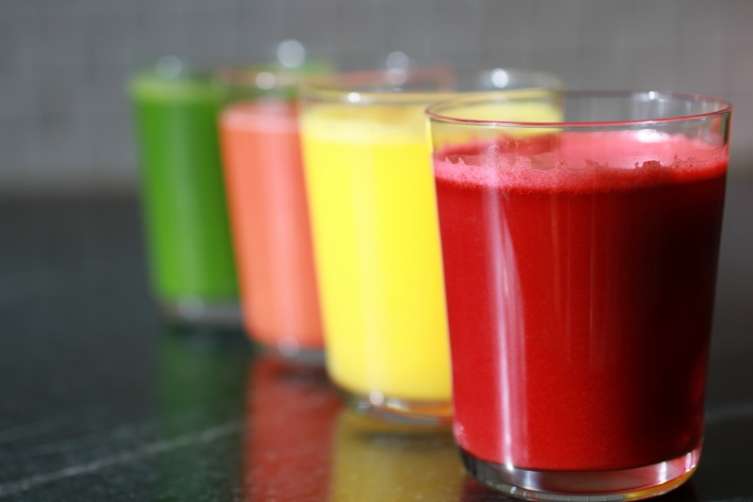Diehard juicing fans will tell you to drink up: juicing helps you detox, boosts your digestive system, reduces your risk of a plethora of disease and of mortality, and boosts your energy levels. The process of juicing involves extracting the juice from the fruit or vegetable by removing its fiber. The result is that most of the fruit or vegetable’s vitamins, minerals, and phytochemicals are contained in the juice. Enzymes may also be more accessible in juice than they are in whole fruit. Since juicing removes the fiber of fruits and vegetables, the idea is that you give your digestive system of a rest while it quickly and easily absorbs micronutrients directly from the juice.
Sounds great, but here’s a catch: juices are highly concentrated in the good stuff like vitamins, minerals, antioxidants, and enzymes, but they can also be highly concentrated in sugar and calories, especially fruit juices. Since juices don’t contain fat or fiber, they aren’t very filling, and it is very easy to drink a lot of them. Because they are not very satiating, there can is a temptation to eat again shortly after consuming a juice. Calories from juices and other health-supportive foods are still calories. Overconsumption of any calories can lead to weight gain. Also, keep in mind that not all vitamins are the same. Vitamin C and Bs are well absorbed through juice. Vitamin A, E, and K are better absorbed through the whole foods. Some vitamins are more accessible if the whole food has been cooked or if fat has been added.
According to the Mayo Clinic, juicing is probably not a lot healthier than eating whole fruits and vegetables. There is little scientific evidence that juicing supports cleansing, but juicing could be part of a health-supportive lifestyle where you keep your liver and kidneys in good shape. Healthy kidney and liver function supports healthy daily detox. Drinking juices can add to your nutrient intake, but it is not necessary for optimal health.
Experts suggest that freshly extracted juice might be a good way to get more fruits and vegetables into your diet, especially if you normally don’t consume many fruits or vegetables. This creative approach to getting more nutrition might lead you to develop better eating habits.
If you do choose to drink juice, choose your juices wisely. Most commercial juices are overly processed, heated, and lacking in the nutrition and benefits of freshly extracted juice. The three ways to start a juice regiment include: (1) buying a juicer and fresh produce and juicing at home, (2) going to your local juice bar, or (3) buying juice from producers like Juice Press or Pressed Juicery that sell cold-pressed, unpasteurized, slow oxidizing juice. However you choose to incorporate juice into your diet, make or buy just as much as you need for that drink or for the day. Unpasteurized juice can harbor dangerous bacteria, and juice that sits out can become less nutritious than freshly made or freshly opened juice.
Juice can be a great addition to your diet and part of a therapeutic regime, but it is not a requirement for lifelong health and wellness. Try new flavors, new colors, and new combinations in your juices, but be wary of the potential for increased calorie and sugar consumption.

























